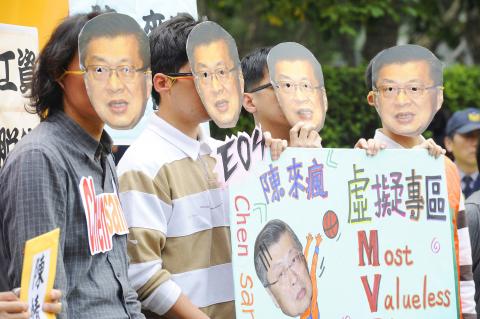Executive Yuan spokesman Philip Yang (楊永明) said yesterday the government had no plan to decouple foreign workers’ wages from the minimum wage in Taiwan because such a policy would be “unfeasible.”
“From the perspective of national law and international norms, it is a complex legal and ethical issue that raises human rights concerns. The Executive Yuan has the same view as the Presidential Office on this issue,” Yang told a press conference.
“There is no point of divergence on the issue between the Presidential Office and the Executive Yuan,” he added when asked to comment on reported disagreements over the issue between President Ma Ying-jeou (馬英九) and Premier Sean Chen (陳冲).

Photo: George Tsorng, Taipei Times
Local media reported that during the Chinese Nationalist Party’s (KMT) Central Standing Committee meeting on Wednesday, Ma said he supported Council of Labor Affairs Minister Jennifer Wang (王如玄) in insisting on retaining the same minimum wage system for local and foreign workers, preferring to focus on brand names and innovation as long-term strategies to enhance the country’s competitive edge rather than to engage in a race to the bottom in terms of wages.
Ma’s remarks came one day after Chen said in the legislature that the only way to adopt a two-track minimum wage system would be to establish “virtual offshore” areas to exclude the application of the minimum wage rule under the Labor Standards Act (勞動基準法) to employees in those areas.
Chen mentioned the idea again during an interview with the CtiTV on Wednesday night.
The delinking of the minimum wage for domestic and foreign workers is not allowed under the current legal system, but it was worth considering under what circumstance the wage rules for foreign workers could be considered separately of minimum wage regulations, he said.
“That’s why I proposed the idea of ‘virtual offshore’ area,” he said.
Chen said the idea of a “virtual offshore area” was an alternative to a possible free economic demonstration zone, a pilot project the government is looking to implement as it prepares the way for accession to a future Trans-Pacific Partnership trade bloc.
The proposal that would allow for free movement of capital, personnel, goods, and information is being formulated by Council of Economic and Development Minister Yiing Chii-ming (尹啟銘) and should be ready in about a year, Chen said, adding: “We will communicate with concerned parties about the issue.”
Taking issue with Chen over his remark that a “virtual offshore area” would have to be established for a dual wage system to be feasible, a labor group staged a protest outside the Executive Yuan yesterday morning.
Taiwan Labor Front secretary-general Sun Yu-lien (孫友聯) said that a dual wage system would benefit only employers. It would legitimize exploitation of migrant workers and dissuade employers from hiring local workers.
Sun said Chen’s comment was “outrageously rash” and did not offer a likely way to resolve the problem.
The minimum wage debate was triggered last week when legislators proposed the introduction of a dual minimum wage system to help protect local workers.
KMT Legislator Lo Shu-lei (羅淑蕾) said that Taiwanese companies have been forced to close or move overseas because of -increasingly higher wages for foreign workers, which in turn has cost domestic workers their jobs. The legislators suggested that the business sector be left to determine the minimum wage for foreign workers.
Additional reporting by CNA

Taiwan is to receive the first batch of Lockheed Martin F-16 Block 70 jets from the US late this month, a defense official said yesterday, after a year-long delay due to a logjam in US arms deliveries. Completing the NT$247.2 billion (US$7.69 billion) arms deal for 66 jets would make Taiwan the third nation in the world to receive factory-fresh advanced fighter jets of the same make and model, following Bahrain and Slovakia, the official said on condition of anonymity. F-16 Block 70/72 are newly manufactured F-16 jets built by Lockheed Martin to the standards of the F-16V upgrade package. Republic of China

Taiwan-Japan Travel Passes are available for use on public transit networks in the two countries, Taoyuan Metro Corp said yesterday, adding that discounts of up to 7 percent are available. Taoyuan Metro, the Taipei MRT and Japan’s Keisei Electric Railway teamed up to develop the pass. Taoyuan Metro operates the Taiwan Taoyuan International Airport MRT Line, while Keisei Electric Railway offers express services between Tokyo’s Narita Airport, and the Keisei Ueno and Nippori stations in the Japanese capital, as well as between Narita and Haneda airports. The basic package comprises one one-way ticket on the Taoyuan MRT Line and one Skyliner ticket on

Starlux Airlines, Taiwan’s newest international carrier, has announced it would apply to join the Oneworld global airline alliance before the end of next year. In an investor conference on Monday, Starlux Airlines chief executive officer Glenn Chai (翟健華) said joining the alliance would help it access Taiwan. Chai said that if accepted, Starlux would work with other airlines in the alliance on flight schedules, passenger transits and frequent flyer programs. The Oneworld alliance has 13 members, including American Airlines, British Airways, Cathay Pacific and Qantas, and serves more than 900 destinations in 170 territories. Joining Oneworld would also help boost

A new tropical storm formed late yesterday near Guam and is to approach closest to Taiwan on Thursday, the Central Weather Administration (CWA) said. Tropical Storm Pulasan became the 14th named storm of the year at 9:25pm yesterday, the agency said. As of 8am today, it was near Guam traveling northwest at 21kph, it said. The storm’s structure is relatively loose and conditions for strengthening are limited, WeatherRisk analyst Wu Sheng-yu (吳聖宇) said on Facebook. Its path is likely to be similar to Typhoon Bebinca, which passed north of Taiwan over Japan’s Ryukyu Islands and made landfall in Shanghai this morning, he said. However, it